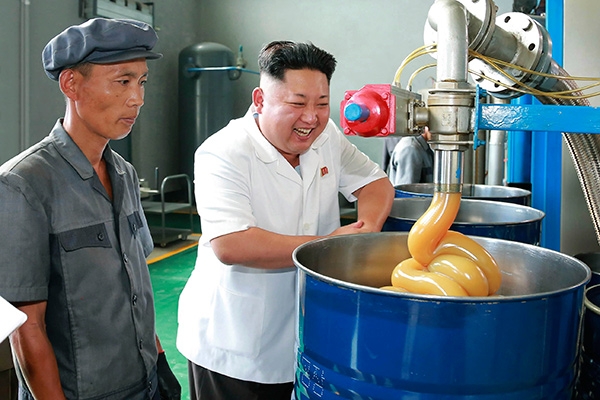
It is reported that the candidate for the post of President of the United States Donald trump has expressed willingness to discuss the nuclear issue with North Korean leader Kim Jong-UN. In an interview with Reuters he stated that he will hold dialogue with the North and no problems in not seeing. Meanwhile a detailed plan for the resumption of dialogue trump not submitted.
Such statements caused a few inappropriate response, especially nakariakov and neoamericanist, zagovorili about the impending change of course. The author, frankly, do not really understand why in some circles trump is not seen as a populist, but as a “representative of the progressive community” that, once in power, will do all right and, for example, will pursue Pro-Russian policy. Also the author is not sure that he ever becomes President, because his image is leading many to vote in the paradigm of “anyone but him”, and this had seriously hampered they exploited the trend “who else but a politician of the old school”. Therefore, in this text we rather answer the question, can we expect drastic changes in the case that the President will be the representative of the Republicans.
First, note that in addition to specified statements about readiness to dialogue with Kim Jong-UN, trump made a lot of statements that don’t always fit together. For example, he called Kim Jong-UN is a maniac, occupying a tough stance against Pyongyang, has called nuclear weapons the greatest threat to peace, stressing that Kim Jong-UN must be stopped. He also talked about the fact that the nuclear issue on the Korean Peninsula should solve the China, or Beijing will be forced to watch as his suffering trade with the United States. He also talked about the fact that South Korea and Japan should pay for the upkeep of American troops on its territory “full price”, but otherwise troops can withdraw. However, he also admitted the possibility that South Korea and Japan can have nuclear weapons of their own and then they with the North will constrain each other.
Second, campaign promises mean little, and most importantly – trump is going to concentrate on internal American issues. Foreign policy, especially in the Korean issue, may be a bargaining chip in the political or trade issue small priority that will be addressed by a residual principle. And then, probably, the question is, what group of people will oversee the Korean direction, while trump will have to do more important things.
Thirdly, we know a few examples of how during the reign of one President is his policy on the North Korean issue has varied quite strongly. In the early nineties, the Clinton administration seriously considered the option of large-scale war against North Korea and was stopped by the data on casualties, which American public opinion would be considered prohibitive. At the end of the Clinton administration, Madeleine Albright visited Pyongyang, and Cho Myung RoK, the then second man in the leadership of the North, was in Washington, and it almost came to a visit to Pyongyang in first person. Madeleine Albright described it in his memoirs. President George W. Bush started with a very hard antipregnancy rhetoric, but, at the end of his reign, the six-party talks are developing very dynamically and the parties came to the possibility of settlement of this difficult question.
Here, in General, probably, it is necessary to note, that representations of non-professionals limit the power of the American President quite often develop under the influence of stamps of other countries. On the one hand, U.S. foreign policy is a presidential foreign policy (as, indeed, both in Russia and in the Republic of Korea). But that’s where the similarity ends.
First, unlike other countries with a strong presidential power, the President is the chief Executive; secondly, the power of the President is constrained by congressional authority on the model of checks and balances, which the US President is forced to lead with the senators long talks on many foreign policy issues; thirdly, in the United States is quite large the role of research centers (think tanks) that have a significantly greater impact on the process of foreign policy decision-making and political lobbying, as analysts at research centres often cooperate to the authorities, participating in the system of foreign policy decision-making.
In addition, the President is forced to implement its policy in a certain ideological and political corridor in order not to lose support of his party and the support of public opinion. The time for charismatic leaders who can dramatically go against the trend, for the reasons described above passed.
Therefore it is not necessary to create illusions. It is necessary to take into account any variants of development of events and remember that the range of opinions of analysts, the US on the Korean question are quite diverse, however, seriously to have dialogue with Pyongyang, recognizing it as fundamentally equal partner, to put it mildly, not ready one. But U.S. public opinion is under the influence of the law of Stopia, see in North Korea, a branch of Mordor and the concept of negotiations with evil will be considered inadmissible.








